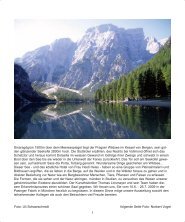Tobique First Nation, NB August 2010 - Schaarschmidt IT
Tobique First Nation, NB August 2010 - Schaarschmidt IT
Tobique First Nation, NB August 2010 - Schaarschmidt IT
Create successful ePaper yourself
Turn your PDF publications into a flip-book with our unique Google optimized e-Paper software.
WOODSTOCK RESERVE (Part III)<br />
Anything west of Fredericton was considered back country with little development.<br />
It was far from the ocean. There was little to attract tourism. It was considered a remote<br />
area. Sportsmen wishing to hunt or fish in the area were required to have an New<br />
Brunswick guide. No one from the states was permitted into the area during th snow<br />
season. On one occasion the famous Edwin Tappan Adney enjoyed playing the<br />
backwoodsman was in the post office one day when two sports from Boston appeared.<br />
One tried starting a conversation with the local asking Adney how he liked the Red Sox.<br />
"Don't know, never wear um." was the reply. The sports left bursting into laughter while<br />
inside those inside chuckled at the sophisticated sportsmen. The Penobscot Indians on<br />
their Old Town Island Reserve were much more dependent and familiar with the more<br />
sophisticated life of a large city such as Bangor and adjusted and accepted white ways<br />
much faster. Woodstock was about 25 years behind them in adapting to the white<br />
man's world.<br />
There were three levels of people at Woodstock: some were elderly instilled with<br />
the life and values of a hunting society, younger people who broke with Indian traditions<br />
and began to lean on the white culture surrounding them, and younger people who saw<br />
little future in keeping their culture. Out of this came some who were inspired and proud<br />
of their heritage. They were like the lumbermen log rollers who knew just how far they<br />
could go before braking and reversing the roll to dump their opponent in the water. They<br />
felt Indians must be prepared to enter the white world to survive. It was impossible to<br />
return to the hunter lifestyle. Women had a slight taste of life away from the reservation<br />
when they crossed their border to sell baskets to white households. Game laws forced<br />
the men away from their traditional hunting and fishing life. Other laws and regulations<br />
made it more difficult for Indians to retain their positions as guides, as they would have<br />
to pass a test requiring a good reading ability.<br />
Language is culture, it defines and describes the culture of the people who use it.<br />
The language changed a bit for each of the levels or groups as English came into use<br />
and soon over took the traditional language of the hunting society. The old language<br />
was slow, drawn out and often took much time to describe what a person wanted to say.<br />
Younger people wanted language to be faster. They began cutting off a letter or syllable<br />
here and there. They laughed at the older people with their slow drawn out way of<br />
speaking. Such speakers became very introverted and silent except when in the<br />
company of other elders. When one spoke in the traditional language, elders could<br />
usually tell the origin of the speaker or his parents. Each Maliseet village had some<br />
words, phrases, or distinguishing expressions used only by each individual village. Most<br />
Woodstockers retained good hearing having lived in a rather quiet world without radios,<br />
outboard motors. or other tools such as chainsaws. Hunters taught their families to be<br />
quiet. They did not want to scare game. The woods had become a noisy place. People<br />
often had to yell to be heard. Some elders discouraged the younger people in learning<br />
their language. They were sure that if one were to get on in the world, English was the<br />
language to know. Who beyond the reserve knew Maliseet? The real jobs were in the<br />
white world.<br />
In the 1960s professional linguists came to learn and save the almost lost Maliseet



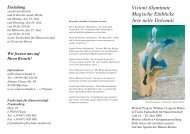
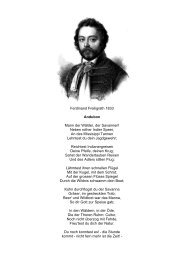
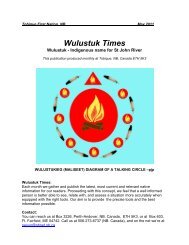
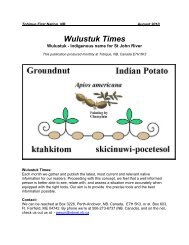
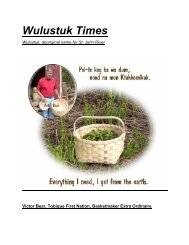
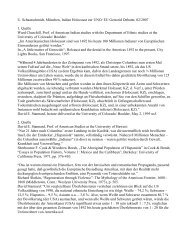

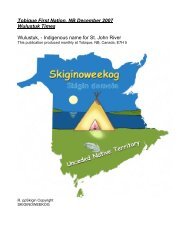

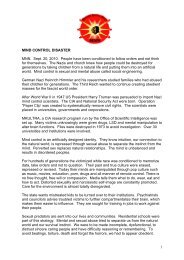

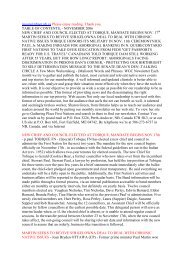
![WE HOLD THE ROCK [ALCATRAZ], SAID ... - Schaarschmidt IT](https://img.yumpu.com/22715400/1/184x260/we-hold-the-rock-alcatraz-said-schaarschmidt-it.jpg?quality=85)
